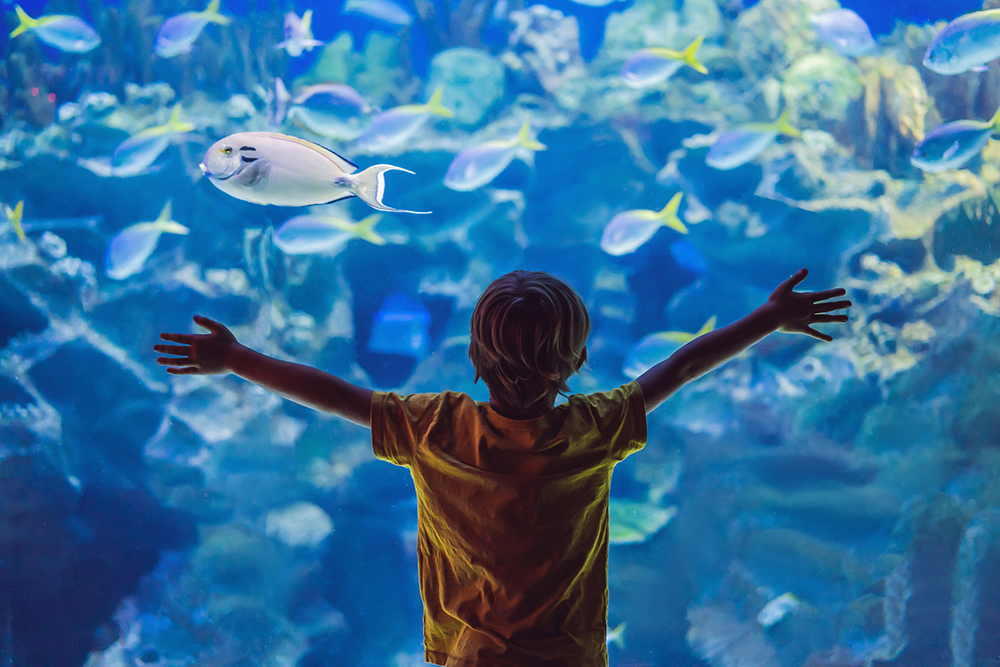
Exciting news. To ‘showcase the vibrant diversity of both marine life and the LGBTQ+ community’, the visionary Bristol Aquarium has just announced a one-off tour of non-binary fish. On 28 June, its Sunset Seas exhibit will ‘celebrate love, life and the beauty of being yourself’ by illuminating with brightly coloured lights a collection of creatures that ‘defy the binary, change sex and mirror the spectrum of identities found in the human world’. Adults-only tickets are a mere £18.50, so rush to reserve your place now.
We’re presumably to conclude from this racy reveal that because some fish can change sex and hermaphroditic undersea organisms are commonplace, for humans sex is a phantasmagorical multiple choice and we can change sex, too. Thus the aquarium’s attendees can enjoy ‘a safe, inclusive and joyful space for people to connect and be themselves’. Or be other than themselves, which is more the point.
Claiming to inhabit an exotic in-between is no different from claiming to be a tree… or fish
Now, I’m fractionally sympathetic with the yearning of marine biologists to appear with-it and right-on as the hallowed month of ‘Pride’ looms ever closer, when their field must present few opportunities to, if you will, get in the swim of things. There’s just one little problem: people are not fish.
Nature, which many progressives feign to revere, may display an exhilarating variety – or what those ineluctably drawn to the now most overused noun in the English language would choose to call ‘diversity’. But nature can also be infuriatingly rigid. She may seem bossy and unfair, but Gaia determined many years ago that humans are mammals, which reproduce through the mating of male and female. I hate to break it to the scads of young people desperate to distinguish themselves from dreary flat-out men and women and dumpy old heterosexuals, but for people there is no such thing as being ‘non-binary’. You’re stuck in a binary organism, and claiming to inhabit an exotic in-between is no different from claiming to be a chair, or a tree or… a fish.
Granted, humans are very rarely born with confused reproductive organs. But in our species, mix and match genitals are always a mistake. To use a word I’d bet serious money is now a gasp-inducing no-no, the few babies born with discombobulated sex characteristics suffer from deformity. Verifying this whoops! quality? Unlike fish, human hermaphrodites cannot mate with themselves and make more babies. Further, unlike fish, humans cannot change sex. We can wear dresses not trousers, play with toy trucks instead of dolls and even get gruesome plastic surgery, but we are immutably male or female in every cell. If you dislike that setup, don’t complain to me. I didn’t make the rules.
For years, we’ve been subject to a sustained war on the whole concept of normality. This campaign has been so culturally successful that at some American universities, over half the student body has joined the alphabet people. Yet one thing hasn’t changed: nature is still and always will be heteronormative. We may have concocted some expensive workarounds, but absent a tremendous amount of medical bother, only the boring old in-and-out will produce another little Olivia or Jayson. Cruelly, nature has ensured that, unless they possess the considerable resources required for surrogacy or IVF, most of the alphabet people whose inventive practices we celebrate next month will die out, taking their inventive practices with them.
Evolutionarily, this makes perfect sense. We may have socially embraced tolerance. Yet without elaborate medical help, gays, lesbians, infertile or castrated trans people, asexuals, ‘self-sexuals’ and the delusionally ‘non-binary’ don’t perpetuate the species. (Bis get a pass only if they do overtime with the opposite sex.) Given the West’s threateningly low birth rates, it is therefore biologically perverse to dedicate an entire month to promoting behaviour that in the main truncates the genetic line.
Personally, I can’t see why any sexual proclivity should engender ‘pride’. Various methods of amusing ourselves in the bedroom might sensibly inspire satisfaction, affection, embarrassment or humour in retrospect; OK, ideally not shame. But fitting together a limited number of body parts entails pretty primitive puzzle-solving; it hardly qualifies as an accomplishment one might vaunt. Still, if we’re to laud any erotic entertainment as deservedly fostering pride, that would have to be bog-standard shagging – which alone as a default convention has the capacity to sustain the human race. Heterosexual Pride Month might have something going for it.
Bristol Aquarium might therefore do the world an enormous favour by emphasising to the viewers of Sunset Seas that all the kinky fish in this exhibit pursue practices that make lots more kinky fish. If some fish can change sex, that’s because this ability is to their Darwinian advantage. Most importantly, please explain that, while carving up human genitals reliably results in infertility and sterility, this fascinating flexibility in fish in no way inhibits their capacity to reproduce – because if it did, natural selection would guarantee that marine transgenderism would disappear. The curators could be of enormous therapeutic help were they to stress that hermaphroditism in their tanks is not a supremely rare and unfortunate birth defect (oh, I bet we’re not supposed to use that expression, either) but is by evolutionary design – a design that again, most importantly, allows the fish to reproduce.
Marine biologists might counsel the aquatically curious, then, that, however supportive of sexual ‘diversity’ corporations draping their headquarters in rainbow flags have grown, nature solely rewards humans for the so-called vanilla kind. So if younger visitors can possibly stand it, they might keep a hand in straight-up fornication.
As a footnote, behold a little-observed casualty of the war on normalcy. I was a slightly strange kid – socially incompetent, given to peculiar passions, prone to writing 30-page short stories that bored my classmates stiff. I was an oddball; I now make a living as a professional oddball. Nowadays, though, young people seem to latch on to aberration – anything to escape the disgraceful classification of ‘normie’. No normal, no abnormal. By eliminating the mainstream from which to depart, we’ve inadvertently endangered an underappreciated species: the weirdo.








Comments